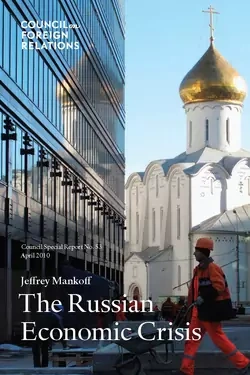
The Russian Economic Crisis

- Council Special Report
- Concise policy briefs that provide timely responses to developing crises or contributions to current policy dilemmas.
Overview
Nearly two decades after the fall of the Soviet Union, the character of Russia, its principal successor state, remains unresolved. So, too, does the character of Russia's relationship with the West. Though the intense U.S.-Soviet rivalry of the Cold War is over, Russia has not become the consistent partner that many on the outside hoped would emerge after the Cold War's end. The United States and Europe have taken issue with many elements of Russia's domestic trajectory and regional and international posture, including its democratic practices, energy-related activities in Europe, stance on Iran's nuclear program, and actions in the 2008 Russia-Georgia conflict. At the same time, many Russians are also disappointed with Western policies and actions, including sympathy for Georgia, U.S. plans for missile defense, and, above all, the enlargement of NATO. This has made for a mix of resentment and assertiveness in Moscow.
A principal factor enabling this assertiveness in recent years has been Russia's strong economic growth. Since 2008, though, Russia, like many other countries, has experienced a deep economic crisis. The question is how this crisis might affect Russia's domestic politics and foreign policy and, consequently, whether any change is warranted in U.S. policy toward Moscow.
More on:
In this Council Special Report, Jeffrey Mankoff examines just this set of issues. He starts by identifying three elements of the economic crisis in Russia: a financial crisis that hit Russian banks and firms, a sharp decline in the price of Russia's principal export commodities, and a recession marked by low domestic demand. He then analyzes the crisis's implications for Russia's political dynamics and foreign policy. Mankoff argues that economic distress has weakened Russia's principal instruments of international influence. Lower energy prices have reduced Moscow's power in that realm, while the crisis has decreased resources for Russia's military and for loans to its neighbors, diminishing Moscow's influence in the former Soviet sphere.
All of this, Mankoff contends, makes Russia less able to challenge the international order and U.S. leadership in particular. The economic crisis thus presents an opportunity to deepen American and European economic ties with Russia and integrate the country more firmly in the international system, something that could, over time, bring Russian and Western interests closer together. The report makes several recommendations to this end. Among these are, first, steps to facilitate trade, investment, and capital flows between Russia and both the United States and Europe. Second, the report urges U.S. congressional approval of the so-called 123 agreement that would allow Russia to reprocess used American nuclear fuel. This would benefit Russia financially and perhaps encourage it to play a stronger role in limiting Iran's nuclear development. The report also argues for leaving open the possibility of Russian membership in the World Trade Organization and helping Russia resolve obstacles to its accession, including disputes with Georgia, if Moscow makes progress on relevant reforms. Finally, Mankoff advocates U.S. and European Union efforts to strengthen governance in other post-Soviet countries in order to reduce their vulnerability to Russian pressure and discourage Russia from pursuing a dominant regional role.
As Mankoff argues, this policy agenda comes with some urgency. A strong economic recovery could well embolden Moscow and increase its resistance to the kind of integration that the report advocates. The Russian Economic Crisis, with its perceptive analysis and thoughtful recommendations, is thus both informative and timely. It makes a valuable contribution to the debate over how to deal with a weakened but still highly relevant Russia.
Educators: Access the Teaching Module for The Russian Economic Crisis.
More on:
 Online Store
Online Store